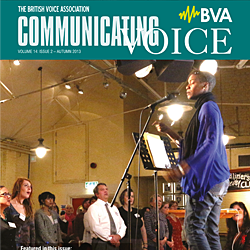About the Association
Archived book reviews
Successful Singing Auditions
Gillyanne Kayes and Jeremy Fisher
Published by A & C Black
Review by: Gordon Stewart
At this very moment, gentle reader, you are very likely making up your mind as to whether to continue to read what I am writing. I am being judged, audited, auditioned. It's part of life. We have to put our heads above the parapet if we want to make any progress, and ultimately find the courage to put our bodies and souls in the firing line, too. Any book that sets out to help us do that deserves serious attention.
Successful Singing Auditions is addressed directly to the reader, which explains the way I've written my first paragraph. Not, however, to the general reader. This book "will enable you to regard auditioning as a process, not an end gain, and to accept it as part of your life as an actor." The authors take this very confident tone throughout: "You will also begin to enjoy your auditions and to use them creatively". It's refreshing in its way. "Ms Kayes is an expert voice trainer and consultant to West End performers, Mr Fisher is a Musical Director, vocal coach and pianist with over 8,000 West End auditions to his credit." It's useful to know where we are all coming from, and come to think of it, I realise that I too must have been involved in thousands of auditions, playing, singing, judging.
The book sets out on a rather basic level, aimed, perhaps, at intending actors and dancers in their last year at school. Hence the explanation on the first page of what an audition is, and that for a music audition "there is music and you have to sing." It ends in the same tone of voice: "If you are going to be an actor, singer or dancer, auditioning will be part of your professional life." In between, the target gets less precise. The writing and the content gets more complex, and I suspect that the book needs to be used in conjunction with workshops, in which the authors are at hand to clear things up, and reassure us as we struggle to put our consonants in the right place on the right pitch, and learn how to deal with an audition pianist who is likely, they say, to be an enemy.
Inevitably the text spreads beyond the audition situation into instruction on how to perform single songs. In all walks of our singing life we have to perform songs out of context. We have to switch ourselves on and be incandescent in a concert situation, a recording studio, or, for that matter, in the studio of our teacher or coach.
Those of us with our feet in the performance pool have our own ways of finding the truth of what composers and writers mean. Nowadays I look for new weapons in the arsenals belonging to those concerned with straight acting. I try to resist the temptation to be too specific - working with other singers is not about getting them to reproduce what I would do in their place.
However, some singers want more specifics, especially if they are in a hurry, or unsure, or hope to fulfil the expectations other people have of them. The Kayes-Fisher way of working could well be of help. Its systematised method is meant to bring a sense of security, especially to those who are new to the business of singing.
The work here is pure text-book, with one or two unnoticed slips: for example, you are told to go through your song phonetically (using IPA symbols if you know them), and then decide whether you are going to use an American accent or not, and then maybe start all over again. Some stringent editing would help.
I tried out the book's formula for the Baker's Wife's song Moments in the Woods, and I think I got pretty close to what is prescribed. I felt I would be as good as the next person, then I found myself asking if I wanted to be as good as the next person. Did I not want to be as good as me? But that is a more distant target, and when you are looking for work, the pigeon-hole might be more important than the pigeon.
I was prompted to take David Craig's On Singing on Stage off my shelf. Its remit is wider - as the title suggests - but Mr Craig devotes considerable space to auditioning. His audience is older. The central information is much the same, but then audition experience is pretty well standard by now. He is a different sort of teacher, and his method of getting to the core of a song takes a different route. He is also something of an entertainer, and he is witty, as well as instructive. He too tends to be exhaustive as he describes his classes (a tape-recorder can be a bad friend to an author). He no doubt suffers, like most of us, from a compulsion to share everything he knows. A mixture, I would guess, of a genuine desire to communicate, and a genuine desire to be important. And why not, indeed ? I am doing exactly the same thing.
The Fisher-Kayes partnership is not afraid to be controversial, and it would be a dull book that played safe. My own experience, for example, does not lead me to believe that a song which is an expression of your own personality is necessarily easier to perform in an audition. It can be much simpler to assume someone else's persona. More of your attention is involved. Many fine actors, singers and dancers are never more themselves than when they being actors, singers or dancers. Instrumentalists too. It's not unusual to find that they have nothing much to say beyond what they do for a living. Nor do I believe that the quiz that the book proposes to help you find your own true self is particularly well planned. There are more caveats: the sheer complication of preparing various scores is daunting if you're on your own. Again, the presence of a charismatic teacher seems essential.
You don't have to agree with everything you might read between the paper covers of this book. The book is not primarily about passing auditions, getting contracts, and work. The successful singing audition is one which - well, one of the lists in the book gives eight answers to that. None of them is "getting the job". The success of your audition is assessed by you. It's that sort of success. I like the idea - there's truth in it, after all, and it's more comfortable to live with: the audition was a success, even if the singer died on stage. In this case, though, let's hope that this article, or this book, is not only successful for those involved in writing, but succeeds in getting the writers a job or two.
Gordon Stewart, formerly Head of the Voice Department at the Royal Scottish Academy of Music and Drama, trained as a singer and a pianist at the Royal College of Music, he writes, reviews books on singing, teaches, and has an interest in vocal music and the speaking voice.
More archived content online
Disclaimer
Neither the British Voice Association nor the Editor can be held responsible for errors or any consequences arising from the use of information contained in its newsletters (or extracts from its newsletters published online); the views and opinions expressed do not necessarily reflect those of the British Voice Association (BVA) or the Editor, neither does the publication of advertisements constitute any endorsement by the BVA or Editor of any products or services featured.

 Join us Now!
Join us Now! our newsletter
our newsletter free voice care leaflets & information – download here
free voice care leaflets & information – download here Help our work by donating while you shop
Help our work by donating while you shop